by Sophie Witter and Haja Wurie
The Ebola epidemic is taking a terrible toll on communities in West Africa. In Sierra Leone alone, as of the 2nd of November 2014, 1070 people have died since the outbreak started in May. CDC projections suggest that by January 2015, if nothing is done, Sierra Leone and Liberia will have 1.4 million infected people. At a recent meeting on Ebola, a representative of a major international organisation admitted that the delayed response represents ‘a major global health system failure’. In the front line, not only in terms of fighting the epidemic but also in terms of being its victim, are health staff. Of the casualties, 102 have been health workers. Poorly equipped, paid and supported, they are ill prepared to face Ebola, professionally or personally. It is important that we learn how to protect them now and support their work as the emergency fades. This lesson also emerges from other studies of how health workers cope with conflict.
Over the past two years, we have been involved in a research project conducting in-depth interviews with community health workers and officers, nurses, midwives and medical officers in four regions of Sierra Leone to understand their experience before, during and after conflict. Sierra Leone suffered a terrible civil war from 1991-2002, during which most health staff fled the country and some were abducted by rebels. Gradually, the health system has been built up, and in 2010, linked to the Free Health Care Initiative, pay was substantially increased, and a rapid recruitment exercise led to increases in staff numbers.
Ebola came as the next shock, threatening to erode the gains of the post-war period. It adds to the existing factors which reduce retention. Even before the current crisis, in 2011, annual attrition rates ranged from 9 to 50% for different grades of medical staff, according to Ministry of Health human resources data. In interviews, staff recognised the improvements in the health system in general and the recent gains for them in terms of pay and some allowances, but struggled with the cost of living increases, covering for missing staff (89% of registered nurses and 50% of medical officer posts were unfilled in 2011), and poor working conditions. Rural areas are particularly badly affected, with a much lower ratio of staff to population. The rural area allowance, introduced in 2011 to improve the distribution of staff, has not been sustained, and staff in remote areas not only face higher costs of travel to work and for communication with their families, but also more limited access to further training, lack of accommodation, and lack of access to basic amenities for personal and professional use.
As we focus on rebuilding the health sector post-Ebola, some important insights emerge from these interviews, both immediate and longer term. Most urgently, a benefits package should be introduced for health staff, including provision of support for bereaved health worker families. Longer term, routes into the medical profession for those of low-income should be encouraged as it is likely that these staff, especially if mid-level, will more easily be retained in rural areas. The rural area allowance should also be reviewed to establish the additional costs of living and working in rural areas. It is not just a motivation scheme but also needs to cover the extra costs which health workers face. Greater involvement in its design would also ensure that health workers understand how it is meant to operate. A similar issue arises for the performance-based funding scheme, introduced at primary level in 2011, which is not regular or transparent at present. The deployment and management of health staff should also be decentralised, to allow districts to fill priority posts and also ensure that people report for duty in rural areas, where 64% of people live (DHS, 2013).
The Ebola epidemic has also exposed the lack of training for staff in hygiene and disease control measures, the poor health information system, the lack of basic infrastructure (water, electricity and waste disposal) in many of the facilities and the failure to communicate quickly and clearly with staff in a time of crisis.
These will take time and continued investment to remedy. So too will community attitudes, which has been damaged by the association of health facilities with infection. Staff have been assaulted and even thrown out of their houses because they are seen as vectors for the disease. Death rates from treatable diseases have soared as families avoided contact with health facilities, turning back in rural areas to traditional providers such as traditional birth attendants and drug peddlers. The system will recover but it needs not just emergency support but also longer term therapy to develop resilience – therapy which should start with those who stand in the front line.
The work for this paper was carried out in collaboration with the ReBUILD Consortium including institutions from the UK, Cambodia, Uganda, Sierra Leone and Zimbabwe looking at health systems, health financing and HRH issues in post-conflict settings. The ReBUILD Consortium is funded by UK aid from the UK government; however, the views expressed do not necessarily reflect the UK government’s official policies.











